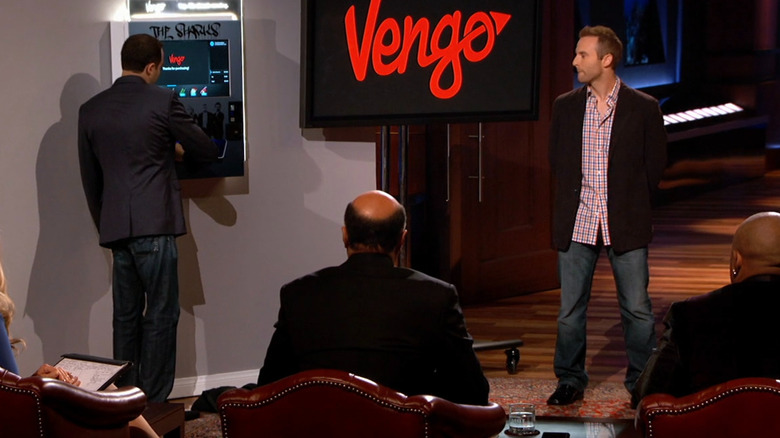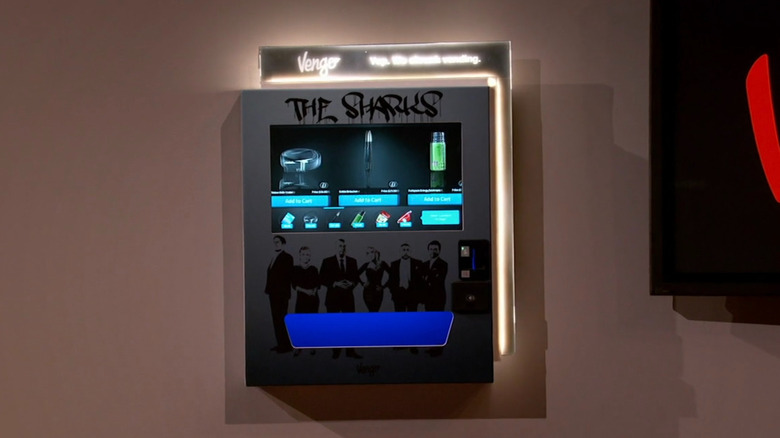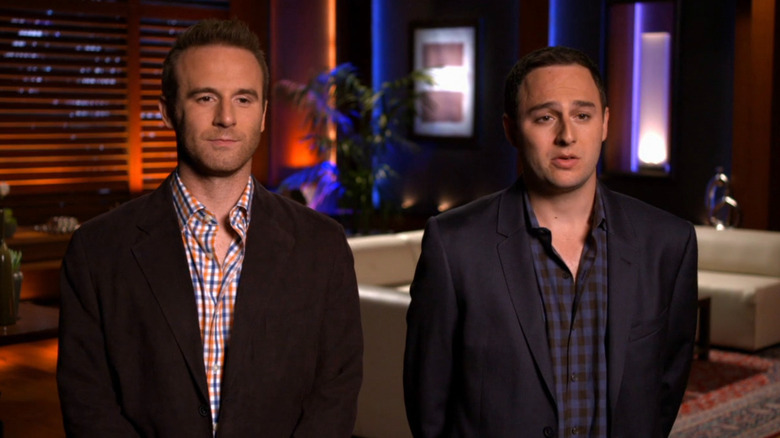Whatever Happened To Vengo After Shark Tank?
Oftentimes, "Shark Tank" entrepreneurs come onto the show simply seeking a way of bringing their business to the next level. But every now and again, a company will pitch with the intent of being the new face of their respective industry. Such was the case for Steven Bofill and Brian Shimmerlik, who believed that their vending service Vengo was the next big thing in the tech world.
Vengo promises to be the logical evolution of vending machine technology. Unlike the big, bulky units common in many public spaces, Vengo offers a sleek, compact design that fits onto walls, eliminating the need for wasted floor space. Each Vengo comes with a digital screen that shows customers what's available in each machine, along with ads for other brands and the ability to track inventory, customer spending habits, and more.
Shimmerlik was an MBA student at the NYU Stern School of Business when he came up with the concept. His initial idea was for vending machines that could be set up in taxis. While it got traction and even won some competitions, Shimmerlik ultimately abandoned it and moved into the stationery space. Even before "Shark Tank," Vengo was reaching a wide audience, appearing in various U.S. hotels and college campuses. The team even managed to get their product out internationally to countries in Africa, South America, and Australia. With such rampant growth, having a shark on their team could help Vengo reach unimaginable heights.
What happened to Vengo on Shark Tank?
In a March 2016 episode of "Shark Tank" Season 7, Vengo founders Steven Bofill and Brian Shimmerlik seek an investment of $2 million for a 12.5% equity stake. With a $16 million valuation, their machines will have to work overtime to impress the sharks.
They demonstrate the product by taking out a bottle breacher. Shimmerlik explains that the machines can only hold small items. They're not looking to replace typical vending machines, but rather want to introduce an alternative with their cloud-based technology. Vengo sells to vending machine companies for $2,500, but that's not their sole source of profit, as the machines cost $2,500 to make. They also charge a $20 monthly fee for each Vengo. Hardware owners can get their own items in if desired, but Vengo owns the media rights and the majority of the product mix. Additionally, brands that want to advertise on their screens pay $200 per SKU per machine per month.
By the end of the year, they expect to bring in $1 million, in large part due to their newfound partnership with the country's largest vending machine company. Despite this, they don't expect to break even until the following year. Mark Cuban, Daymond John, and Robert Herjavec are not fans of the valuation and business model. Mr. Wonderful, aka Kevin O'Leary, offers them $2 million as a three-year loan at 7% alongside 6% in equity. The duo negotiates some more and even gets Lori Greiner to invest her money alongside O'Leary, with both parties agreeing to the three-year, $2 million loan deal at 7% and a 3% equity stake per shark.
Vengo after Shark Tank
The loan deal between Vengo and "Shark Tank" investors Kevin O'Leary and Lori Greiner ultimately never went through. Of course, this isn't uncommon in the aftermath of a "Shark Tank" handshake deal, as further due diligence and negotiations can result in either party choosing to back out. But even without the tech-savvy sharks, Vengo was able to find success and obtain the resources they needed to expand.
The company went into new investment rounds, securing $7 million from famous firms and investors such as Cherry Tree Investments, Gary Vaynerchuk, Scout Ventures, and even hip-hop artist Nas. The tech group ViaTouch Media began working with Vengo to provide advertisers with ways of collecting and selling customer data. These new partnerships helped Vengo bring fresh innovations to their products, with co-founder Brian Shimmerlik telling Ad Age, "We are able to adjust content and messaging in real time based on where the media and product are taking place. The messaging can be very targeted."
In 2017, Vengo, with the aid of the Nassau County Industrial Development Agency, moved from Queens, New York, to Long Island. This was a meaningful step for the business's founders, as Shimmerlik and Steven Bofill started Vengo from the latter's Long Island garage. "It is amazing to come back home with a growing company and set up our headquarters around the corner from where we got started," Bofill said in an interview with Patch. The move came with a new 4,000-square-foot workplace, and Vengo announced that they'd be increasing their team to 30 individuals by the end of the year.
Is Vengo still in business?
Even without the help of a shark, Vengo is shaping up to become one of the most successful brands to be featured on "Shark Tank." Many of their achievements can be credited to the team's willingness to adapt to the times and switch their business model when the time called for it.
Over the years, Brian Shimmerlik and company started to take notice of the value that their digital screen and advertising services offered. When the COVID-19 pandemic hit and slowed down Vengo's vending opportunities, the team made the switch to a Digital Out of Home (DOOH) strategy, allowing them to monetize their business via digitized ads in various locations as opposed to sticking strictly to vending machines. This new model, combined with their vending services, has helped them explode in popularity. Their screens are currently in over 27,000 nationwide locations, including gyms, restaurants, bars, hotels, hospitals, college campuses, and more. Their content receives millions of active engagements every month, making them attractive to numerous advertising agencies.
Vengo has been featured in several high-profile outlets, including the Wall Street Journal, Yahoo Finance, TechCrunch, Business Insider, Bloomberg, and Globe Newswire, to name a few. Today, they bring in an estimated yearly revenue of between $10 and $12 million with an estimated net worth of $50 million.
What's next for Vengo?
It can be hard to watch some "Shark Tank" businesses fail and vanish after having ambitions of becoming the next Apple or Facebook. Many times, the entrepreneurs behind these concepts get in way over their heads and fall flat at the end, either in or out of the tank. However, Vengo may be one of the very few that breaks the mold and achieves big time growth.
In a 2022 interview with NYU Entrepreneurship, Brian Shimmerlik shared where he envisions Vengo going in the near future. With their advertising work proving to be an immensely profitable venture for the company, Shimmerlik aims to continue developing the operations side. Vengo's website recently went through a revamp to prominently display the company's ad services, with a section available for potential partnerships with brands, media agencies, and property owners. Likewise, many of their recent social media posts on sites such as LinkedIn have pushed for this expansion. "In six months, I would expect the number of screens we represent to triple and in three years, I would expect us to be acquired by someone in the Digital Out of Home world, and to be representing a significant portion of the industry," Shimmerlik said.
Clearly, Vengo is not the kind of brand to think small. But with so many amazing feats under their belt already, the sky is truly the limit for this business.




